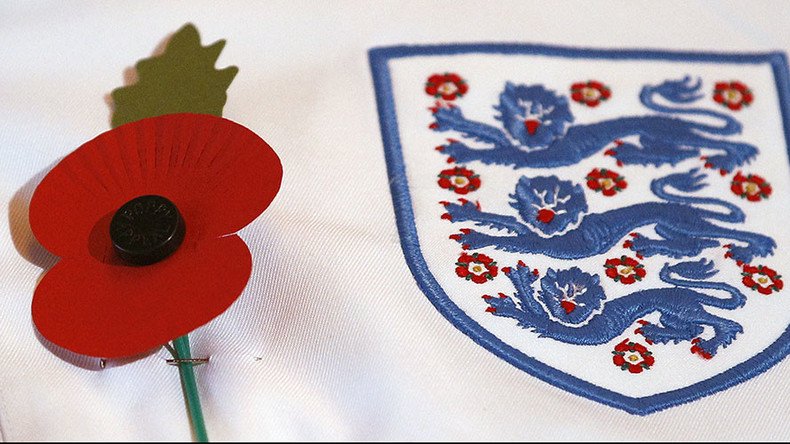FIFA refuses to allow British teams wear ‘political’ poppy on shirts

The Football Associations of England, Scotland, and Wales will meet with FIFA tomorrow to discuss whether they will be allowed to wear poppies on their shirts to commemorate Armistice Day in the upcoming World Cup qualifying matches.
England and Scotland will play each other at Wembley on November 11, the official date of Armistice Day, which is observed in remembrance of the signing of the armistice ending the hostilities on the Western Front in 1918, signifying the end of the First World War.
Wales is set to play Serbia at Cardiff City Stadium the following evening.
FA in talks with FIFA over poppy tribute at England vs Scotland https://t.co/mabXCSjNWIpic.twitter.com/GBVAxea1Ky
— MailOnline Sport (@MailSport) November 1, 2016
All four countries observe the day, known as ‘Remembrance Sunday’ in the United Kingdom, which is marked on the Sunday nearest to November 11. British football teams traditionally hold a minute’s silence and wear embroidered poppies on their shirts that weekend.
However, FIFA rules prohibit political, religious, or commercial messages on shirts and world football’s governing body has consequently refused to allow the national teams to wear the poppy.
Both England and Scotland have asked for an exemption out of respect for the Royal British Legion, a charity that sells poppy badges to raise funds for providing lifelong support to veterans.
This Poppy Appeal #RethinkRemembrance by uncovering the stories of veterans supported by your Poppy: https://t.co/hjm6QsE2vr#PoppyAppealpic.twitter.com/pkag6UUOhy
— Royal British Legion (@PoppyLegion) October 27, 2016
The penalty for wearing the symbol could be a points’ deduction, whereas a compromise has been suggested which would see players wearing the poppies on armbands instead, as was done during England’s 1-0 friendly victory over Spain on November 12, 2011.
“We are working closely with the Royal British Legion once again this year to honour and remember the sacrifices made by those serving in the armed forces,” an FA spokesman said, BBC Sport reported.
“In recent weeks, the FA has led remembrance discussions with FIFA to allow the England team to show its support for the Poppy Appeal during the World Cup qualifier with Scotland.”
An FA statement read: “We are working closely with the Royal British Legion once again this year to honour and remember the sacrifices made by those serving in the armed forces.
“In recent weeks, the FA has led remembrance discussions with FIFA to allow the England team to show its support for the poppy appeal during the World Cup qualifier with Scotland.”
On the day of Scotland’s visit to Wembley, hundreds of commemorative events will be taking place around the United Kingdom.
Due to its symbolism of peace and death and its prominence in Flanders Field, a famous war poem about the battlefield, the poppy is used to remember soldiers of all armed forces who have died in combat since the First World War.
However, it has proven to be a controversial subject in the world of sport in the past.
Why does West Brom midfielder James McClean refuse to wear a poppy?https://t.co/EGQ7AsAUFUpic.twitter.com/hjHjFU1KoT
— The Sun Football ⚽ (@TheSunFootball) October 30, 2016
Premier League winger James McClean, who is Irish and a notable opposer to the league’s custom of wearing a poppy in games closest to Remembrance Sunday, claims observing it would be a sign of disrespect to the victims of Bloody Sunday, in which 14 people were killed when British troops fired on civilians in McClean’s hometown of Derry.
“For me to wear a poppy would be as much a gesture of disrespect for the innocent people who lost their lives in the Troubles – and Bloody Sunday especially – as I have in the past been accused of disrespecting the victims of WWI and WWII,” the winger penned in a 2014 statement.
READ MORE: Russian footballer outrages Turkish fans and media with Putin tee
Russian footballer Dmitri Tarasov was charged with improper conduct by FIFA for bearing a political message in a Europa League game in February.
The Lokomotiv Moscow midfielder removed his shirt to reveal an image of Russian President Vladimir Putin with the words “the most polite president” after his team’s game against the Turkish club Fenerbahce.












